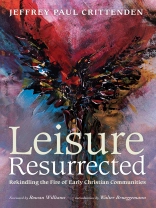As the church emerges from the impact of COVID, how will it reimagine its mission? With all the disruption COVID caused comes an opportunity for congregations. How will the local church organize itself, engage with the neighborhood and world, and offer pastoral care to a planet dealing with the significant issues heightened during COVID? Returning to old patterns of behavior is a wasted chance. A theological opportunity for the church lies in rediscovering the classical aim of leisure.
The early church during the first two centuries offers us an understanding of leisure quite unique from the dominant expressions of leisure, such as Greek schole, Roman otium, and the Jewish Sabbath. By exploring early Christian practices, we can find insights about leisure for mission today. These practices include setting aside a single day of the week to worship, sharing in a common meal open to all, and, following the meal, incorporating into nonwork time care and engagement in the health and vitality of the community in the name of Jesus Christ. The followers of Jesus were consistent, if extraordinary, in meeting weekly, on the Lord’s Day, to worship, eat together, and go out into the neighborhood to live out their faith.
A propos de l’auteur
Walter Brueggemann is William Marcellus Mc Pheeters Professor of Old Testament Emeritus at Columbia Theological Seminary, Decatur, Georgia. He is past President of the Society of Biblical Literature and the author of several books from Cascade Books, including: A Pathway of Interpretation, David and His Theologian, Divine Presence amid Violence, Praying the Psalms (2nd ed.), and The Role of Old Testament Theology in Old Testament Interpretation.(2011), Remember You Are Dust (2012), Embracing the Transformation (2013), and The Practice of Homefulness (2014).







![Couverture du Brian Schrag & Julisa Rowe: Community Arts for God's Purposes [Chinese] 貼近神心意的社群藝術 Couverture du Brian Schrag & Julisa Rowe: Community Arts for God's Purposes [Chinese] 貼近神心意的社群藝術](https://static.worldofdigitals.com/thumb_webp/740/9781645083740.webp)




